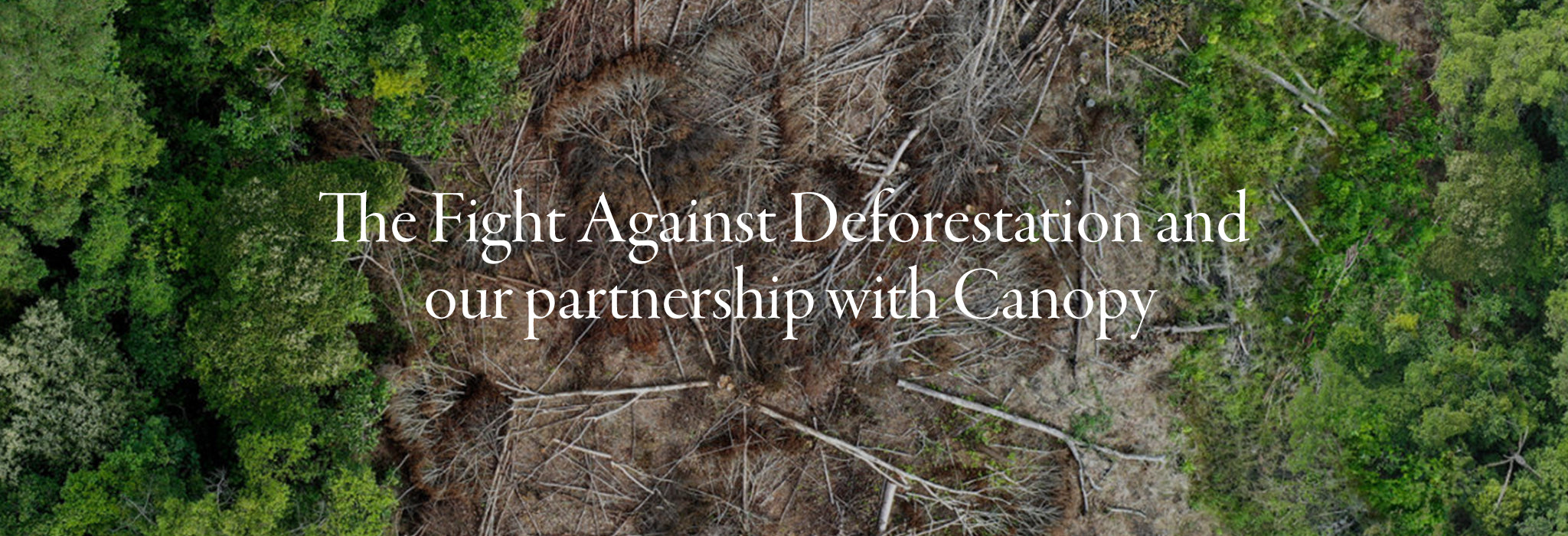
The Fight Against Deforestation and our partnership with Canopy
One of the Sustainable Development Goals we’re committed to is no.15 Life on Land: to Protect, restore and promote sustainable use of terrestrial ecosystems, sustainably manage forests, combat desertification, and halt and reverse land degradation and halt biodiversity loss.
Depending on the region, 35 to 60 percent of the world’s forests continue to be felled to manufacture the products we consume, from furniture to toilet paper. The loss of these critical forests puts species, communities and our climate at risk.
This is why House of Baukjen has committed to causing Zero deforestation. We have mapped our key areas of work that pose a risk to Life on Land and have been working to ensure our operations are run in a responsible manner.
How does conventional Fashion contribute to deforestation?
Fashion might not be the first industry you think about when you think of deforestation. Whilst not one of the worst culprits, the apparel and footwear industries contribute to deforestation both directly and indirectly.
Fibres such as Viscose, Rayon, Cupro, Lyocell and Modal are made from cellulose commonly obtained from trees. The demand for these man-made natural fibres has been growing and the lack of transparency in fashion supply chains makes it hard to ensure that there is no deforestation in the process. This can happen at two stages: using wood from a previously forested area for man-made natural fibres and the clearing of forest to make way for trees of a single species grown to be harvested.
Animal agriculture is one of the biggest culprits of deforestation worldwide, with the destruction of the Amazon Forest being the most famous example. Large swathes of Amazonian land and other tropical forests are being cleared to create grazing land for livestock and grow soybeans as animal feed. The apparel and footwear industries can be complicit in this destruction as they use leather.
The collection of natural rubber is another practice that can lead to deforestation. Most rubber in the world is oil-based, but natural rubber is also commonly used including for footwear. Some brands (most notably Veja) pride themselves in supporting sustainable rubber tapping that protects the trees and provides a monetary incentive to keep forest cover. Unfortunately, many others are less stringent in their sourcing practices and contribute to the felling of rubber trees to harvest the natural sap.
Logistics in the Fashion supply chain can also contribute to deforestation via the use of cardboard and paper packaging.
How can Fashion fight deforestation?
By addressing issues in the supply chain in the areas of cellulosic fibres, leather, rubber and packaging we can help ensure that our garments aren’t causing deforestation.
At House of Baukjen we have phased out cellullosic fibres with a higher environmental impact (such as Rayon and Cupro), and are opting for Viscose and Lyocell of verified sources. Most of our Viscose is now Lenzing EcoVero™ and our Lyocell is Tencell™, which are produced using wood sourced from forests that are responsibly managed, such as through FSC certification. The Forrest Stewardship Council (FSC) certification is given only to materials and products that are responsible in how they use wood and cellulose and don’t cause the destruction of forests.
The leather we use comes from French and Portuguese farms, with full transparency of the supply chain. All of our leather is a by-product of the meat industry (meaning the animals are reared for their meat and not exclusively for leather). The farms where our leather comes from rear their animals outdoors and feed them on local grasslands and with locally sourced grain, nothing is flown in or complicit in deforestation.
At the moment we don’t have any rubber in our collections.
Our packaging, both customer-facing (B2C) and used in our operations (B2B), is responsibly sourced – details in the next section.
Beyond our use of materials, House of Baukjen is happy to support ethical tree planting projects which contribute to healthy biodiversity. Planting tree species that are native to a region and respect local conservation efforts has the most impact in ecosystem restoration and in long term carbon sequestration.
House of Baukjen partners with Canopy
Most recently, House of Baukjen has partnered with Canopy to revolutionise how fashion can contribute to the preservation of the world’s forests.
Canopy is an organisation working with the forest industry’s biggest customers and their suppliers to protect our remaining ancient and endangered forests. Canopy secures large-scale forest conservation and transforms unsustainable forest product supply chains by engaging business executives as champions for conservation and sustainability.
Through their CanopyStyle initiative we commit to ensuring that our man-made cellulosic fibres do not damage any ancient and endangered forests. We are also working to increase our use of recycled fibres that eliminate the need for virgin materials. Our innovative sourcing has better ramifications for biodiversity and the planet.
Another Canopy program we are involved in is Pack4Good. Pack4Good is inspiring us to include more recycled content into our packaging. We have achieved 100% recycled packaging B2C which is the vast majority, and we are continuously increasing recycled content in our B2B packaging. In addition to this, we also reuse as much of our B2B packaging as possible.
Data source and extra information: https://canopyplanet.org

